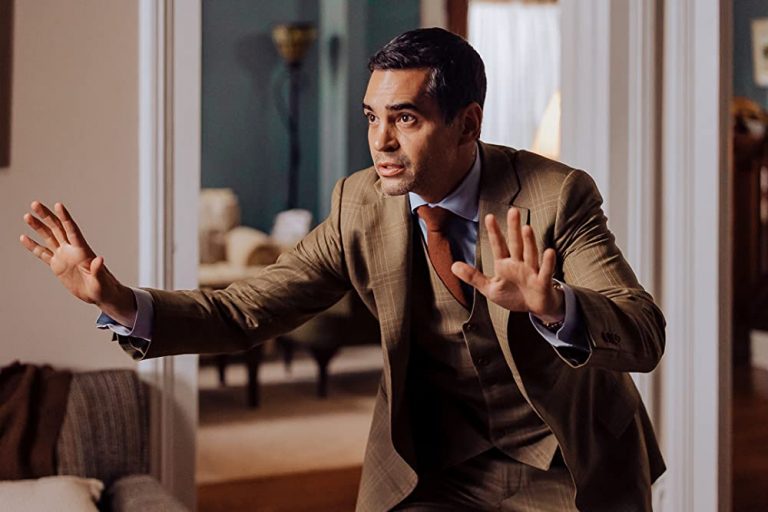End of the Second World War. Fascists trying to escape checkpoints in Milan. A singer who has access to Mussolini’s closest confidant. If these ideas are combined together, who can stop from a dramatic war movie, complete with delicious twists and turns? Yet, Netflix’s Robbing Mussolini (Rapiniamo Il Duce), the newest Italian release confines itself to genre tropes and extravagance to such an extent, that an exciting premise turns into a predictable mess. Read on if you have the same questions revolving in your mind after that frantic climax. You are definitely not alone if you felt too much and yet too little. For those who haven’t seen the heist feature, the analysis contains heavy spoilers.
Robbing Mussolini Plot Summary & Movie synopsis:
Robbing Mussolini is a straightforward heist feature that is set in Milan, at the end of the Second World War. Writer-director Renato De Maria follows the young wartime entrepreneur Isola as he leads a plan to rob the hidden gold treasures of Mussolini that is set to be deployed to Switzerland very soon. Along with a team of shooters and gunmen, Isola takes on the impossible task to rob the treasures. Are they able to anticipate the shocking revelations that come along the way? Will they succeed in their mission? Robbing Mussolini promises to be an action thriller that sets its stakes very high from the very onset.
Robbing Mussolini Movie Review:
Heist film that unfortunately robs your attention span rather than the gold
If one hour and thirty minutes of optimum screen time for a heist film begin to feel too long, you know there is a serious problem. That’s precisely the case with Rapiniamo Il Duce (Robbing Mussolini), the new film by Italian director Renato De Maria (The Frontline, The Ruthless). This is De Maria’s tenth feature film, yet Robbing Mussolini seems to have gained little from the constant factor that troubles De Maria’s works: a needlessly detailed attention to style that shadows the subject. The same condition haunts the brightly revolving shots of Robbing Mussolini, highlighting the exquisite production design and costumes. There is so much at display in the way that is meant to hold your attention, but all these details come at the expense of a composite plot. That is what robs the film of achieving any greatness.
At the outset, Robbing Mussolini sets out to be a heist feature, where the main players in the game are introduced in a swift array. It is almost the end of the second world war, and the scene is set in Milan. There are numerous checkpoints in the city, and the search for Allies is hotly tipped. We are introduced to Isola (Pietro Castellitto), who is some sort of a wartime businessman in weapons, but nothing much is revealed at the outset. There is a certain confidence in the way he responds, which also means he is too sure of himself in a way. Then there is Yvonne (Matilda de Angelis), the beautiful singer with whom he is in a tested relationship. Tested because, Yvonne’s beauty is his most conniving weapon; through her influence and caution, Isola is able to exercise control and forge his way out of place. Yvonne knows this herself and gives in to his whims because she wants to get away from the bitterness of it all, and have a normal life with Isola. Her dreams are small, his are not.
When Isola hatches the plan of looting the fascist leader Benito Mussolini, who is planning to get away with the accumulated gold treasures, he requires a team to help him. Here he is aided by the driver Denis Fabbri (Maccio Capatonda), the sniper Marcello (Tommaso Ragno), the man who knows all about the explosives Molotov (Alberto Astorri), the forger Amedeo (Luigi Fedele), and also when required, the thief (Coco Rebecca Edogamhe). Isola leads these players in a rather ubiquitous manner, as he gives orders without really knowing the consequences can go utterly south. If through these frankly childish gestures Isola tries to paint a daring, confident leader, he comes off as more of an annoyance than anything else. The main escapade of the gold is the grasp of Secretary Borsalino (Filippo Timi) who is also a filmmaker in his own right. In a rather unnecessary plotline, he declares his next feature on Madam Bovary, and that it will star none other than his wife Nora (Isabella Ferrari).

Nora knows about the ways of his husband, and his clandestine visits with Yvonne. She also knows how to keep her husband in check, and this paradox gives a nice little edge to the proceedings that follow. If only the proceedings made any indication of reason after all. Robbing Mussolini follows the heist with one scene after the other, with such a quick succession of twists and resolutions that after a point you cease to care who is speaking and who is not. There are serious issues with the screenplay, which invests little in its characters. Except for Yvonne, most of the supporting characters feel like props that are placed strategically to suit the chase. They come and go, without any impact.
There is no holding back the promise that Robbing Mussolini places in its audience, but what turns off instantly is the convoluted plot developments that feel desperately trying in scope. There is style and little substance. Whether it is the gorgeous camerawork by Gian Filippo Corticelli or the staggering production design by Giada Calabria, Robbing Mussolini scores high in its technical expertise. As Yvonne, de Angelis gives an enigmatic performance that underplays pain and hurt, clad in those beautiful gowns designed by Sara Cavangini and Virginia Gentili. She tries her best in injecting some energy into her character but can do as much as the hurried writing allows her. Castellitto is at odds in playing Isola as someone who is still gathering his wits and powers, but not much of that incongruity is palpable in his flavorless, forceful performance. There is no emotional response or even an iota of attachment to these characters. Robbing Mussolini is a classic case of style over substance, one that takes itself too seriously to consider its place in the world outside. When it does sink in, the thrift is forgettably over and out.
Robbing Mussolini Movie Ending, Explained:
Is the heist successful?
Even if the premise of Robbing Mussolini surrounds the big heist, the characters and their underlying motives come in between. This ensures a sprawling chase sequence that builds towards that high-octane climax. Ultimately, if you ask, if the heist is successful, then Robbing Mussolini is successful in sustaining your attention till the end.
As Isola and his team follows the truck containing gold with guns and aim at it to stop on the tracks, the film rushes towards a highly tense chase sequence. The tire screeches out of control and the truck tumble down the nearby lake, drowning all the gold. Yvonne saves herself from the water at the last minute and finds her way out of the water, gasping.
Isola carries her out and they embrace passionately. Then they are informed that the lake is not that deep after all, and all the gold which they feared had been lost can be recovered easily! The heist, thereby, comes to a successful end.






